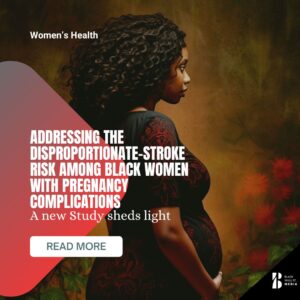WOMENS HEALTH
Addressing the Disproportionate Stroke Risk among Black Women with Pregnancy Complications: A New Study Sheds Light
“Our research offers evidence that a woman's pregnancy history can be a crucial factor in assessing and preventing long-term stroke risk. It's imperative that we consider hypertensive disorders of pregnancy when developing heart screening recommendations, especially for Black women. - Dr. Shanshan Sheehy.”
Black Wall St. MediaContributor
 For a long time, research on the links between preeclampsia and stroke during pregnancy has largely focused on white women, despite the conditions being significantly more prevalent in Black women in the United States.
For a long time, research on the links between preeclampsia and stroke during pregnancy has largely focused on white women, despite the conditions being significantly more prevalent in Black women in the United States.
A new study, however, has sought to bridge this gap and provide vital insights into the associated risks within this overlooked demographic.
The groundbreaking study conducted an exhaustive examination of 25 years of data involving 59,000 participants from the Black Women’s Health Study.
Researchers found that Black women with a history of hypertensive disorders of pregnancy (HDOP), including preeclampsia and gestational hypertension, had a roughly 66% heightened long-term risk of stroke.
Preeclampsia, a perilous pregnancy complication characterized by high blood pressure, affects between 2% and 8% of pregnancies globally.
In the US, however, the rate of preeclampsia and its severe subsequent condition, eclampsia, is a staggering 60% higher in Black women compared to their white counterparts.
“These findings could provide a partial explanation for the disproportionately high occurrence of stroke among Black women compared to other populations,” said Dr. Shanshan Sheehy, the study’s author and an assistant professor of medicine from Boston University Chobanian & Avedisian School of Medicine.
The American Heart Association (AHA) recently revised its guidelines to incorporate pregnancy complications as risk factors for stroke.
As part of these changes, the AHA underlined the necessity for more comprehensive studies on stroke risk in women, particularly those from underrepresented populations.
Out of the almost 43,000 women involved in the study who had previously given birth and had no preexisting heart disease, 1,555 strokes were reported between 1995 and 2019. Of these, 310 were in women with a history of HDOP.
The data showed that women with a prior occurrence of HDOP had an estimated 66% higher risk of stroke compared to those without such pregnancy complications. Furthermore, for women with a history of preeclampsia, the estimated risk was 53% higher.
This association was seen across various age groups and body weight categories.
“This research offers evidence that a woman’s pregnancy history can be a critical factor in assessing and preventing long-term stroke risk,” stated Dr. Sheehy.
She further stressed the importance of considering HDOP in the development of heart screening guidelines, especially for Black women. By incorporating this data, healthcare providers can more accurately tailor preventive measures and assess risk.
The study provides a vital stepping stone in understanding and addressing the alarming disparity in stroke and preeclampsia rates among Black women.
As research continues to evolve, it is crucial that the diverse experiences and risks of all populations are included to ensure more equitable health outcomes.
SOURCE
Black Wall St. MediaContributor










